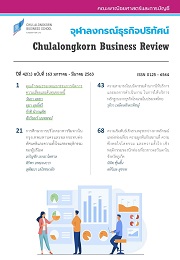Service Innovation Capability and Service Performance: Evidence from Hotel Businesses in Thailand
Main Article Content
Abstract
Currently, the development of the country in the context of Thailand 4.0 focuses on creating value-based economy which is driven by creation of innovation, technology and creativity. Therefore, it is challenging for service business sectors to succeed. The aim of this research is to examine the effects of service innovation capability on service performance of hotel businesses in Thailand. Using the lens of dynamic capability and organizational learning theory, the study model was empirically tested using questionnaire survey of 105 hotel businesses in Thailand. The results from multiple regression analysis indicated that only the dimension of proactive service improvement continuity of the service innovation capability had effect on service performance. The two dimensions of customer involvement willingness and knowledge transfer culture had effects on service advantage, service satisfaction achievement, and service value creation whereas the dimension of network collaboration competency had no effect on service performance. In addition, this research revealed some useful theoretical and managerial suggestions and contributions to academics and executive of service business sectors.
Article Details
Opinions and discussions in papers published by the Creative Business and Sustainability Journal (CBSJ) are deemed as personal opinions and the responsibility of the writers. They are not the opinions or responsibility of the Chulalongkorn Business School of Chulalongkorn University.
Papers, content, information etc. appearing in the Journal are deemed to be the copyright property of the Chulalongkorn Business School of Chulalongkorn University. Anybody or any organization that wishes to publish any part of them or use them in any way must obtain written permission from the Chulalongkorn Business School, Chulalongkorn University.


